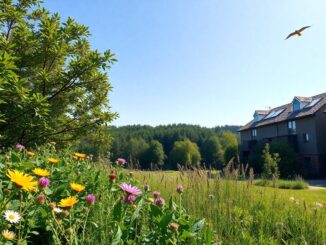The target of the lessons is to help children and teenagers develop a “love of nature” and to have the information to act as “judge and jury for our own actions” on the environment.

The government is thinking about introducing compulsory nature studies lessons for all pupils. The plan to protect the natural world is backed by David Attenborough.
Government considering compulsory nature studies lessons
The Department for Education (DfE) is considering whether pupils should be forced to take lessons focusing on biodiversity and ecology, after the idea was recommended by a landmark government review published last month.
The Dasgupta review recommended introducing these lessons at all levels of education from primary upwards.
Britain’s leading naturalist Sir David Attenborough described the recommendations as “a map for navigating a path towards the restoration of our planet’s biodiversity” and “the compass that we urgently need” to “save the natural world at what may be the last minute”.
Authored by Cambridge economist Professor Sir Partha Dasgupta, the review declared that the education system “should introduce nature studies from the earliest stages of our lives, and revisit them in the years we spend in secondary and tertiary education”.
It adds: “Every child in every country is owed the teaching of natural history, to be introduced to the awe and wonder of the natural world, and to appreciate how it contributes to our lives.
If we care about our common future and the common future of our descendants, we should all in part be naturalists. Even if we had studied nature in primary school, we may not have encountered the subject subsequently. In universities in the United States, it was common practice to require first-year students to complete a course on a broad-brush history of civilisation. There is every reason universities should require new students to attend a course on basic ecology. Field studies that would accompany such a course would be a way to connect students with nature, in particular those who may have grown up in an urban environment.”
The target of the lessons is to help children and teenagers develop a “love of nature” and to have the information to act as “judge and jury for our own actions” on the environment. Nick Gibb, the schools minister, replied to a parliamentary question on the matter that the government “will examine the review’s findings and respond formally in due course”. He stated that ministers were “exploring the option of introducing a new GCSE in natural history after receiving a proposal from exam board OCR, but have made no commitment at this stage”.
Mr Gibb noted that an A-level qualification in environmental science had been introduced for the first time in 2017. DfE officials declared that no firm decision had been made yet on whether ecology or natural history will be made obligatory, as recommended by the review.




